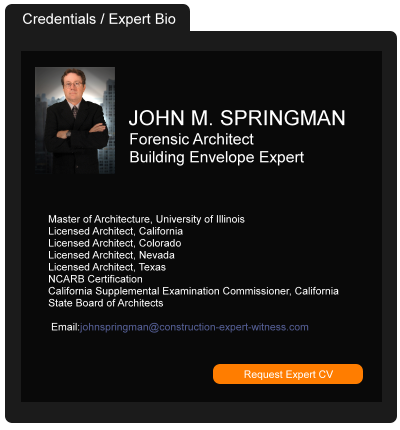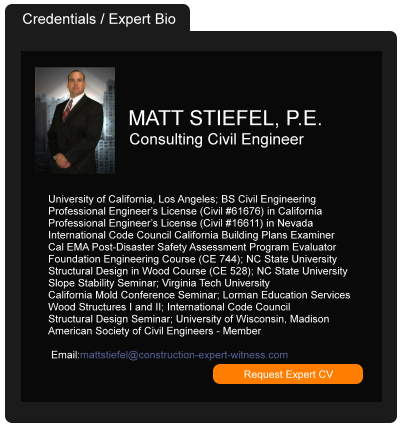Conversations with My Younger Self: 5 Things I Wish I Knew Then
July 24, 2023 —
Steve Swart - The Dispute ResolverI remember the morning I became a construction law attorney. It was on my birthday several years ago when a partner called me into his office and asked me to review the A107 contract form for a large firm client. The assignment gave me a new language to speak and contract provisions that I came slowly to understand.
I quickly moved into construction litigation and would soon learn that a "fragnet" was not the newest social media app but an important part of a delay claim. I read Spearin's biography and learned how to assess recoverable damages for different claims—costs to repair, replacement and betterment, increased financing/carrying costs, and the like.
It took a lot of blood, sweat, and tears to get to where I am now. Echoing Rod Stewart’s sentiment—“I wish that I knew then, what I do now, when I was younger”—here are five tips I’d pass along to the younger me or anyone who is beginning their career as a construction lawyer:
Read the court decisionRead the full story...Reprinted courtesy of
Steve Swart, Williams MullenMr. Swart may be contacted at
sswart@williamsmullen.com
Thank You!
February 28, 2022 —
Garret Murai - California Construction Law BlogI would like to thank the Construction Law Subsection of the Los Angeles County Bar Association for awarding me today (on 2/22/22 nonetheless) the 2022 James Acret Award for Outstanding Achievement in Construction Law Legal Writing.
The nominating committee of the subsection includes a veritable Who’s Who of construction law attorneys including Donna Kirkner (Chair), Michael J. Bayard, Theresa C. Tate, Aaron J. Flores, Marilyn Klinger, Marion Hack, John D. Hanover, James C. Earle, L. Adam Winegard, Bernard S. Kamine and Ashley B. Jordan.
Read the court decisionRead the full story...Reprinted courtesy of
Garret Murai, Nomos LLPMr. Murai may be contacted at
gmurai@nomosllp.com
I.M. Pei, Architect Who Designed Louvre Pyramid, Dies at 102
July 01, 2019 —
James S. Russell - BloombergI.M. Pei, a dominant figure in American architecture for more than three decades who designed the Louvre’s crystal pyramid and the angular East Building of Washington’s National Gallery of Art, has died. He was 102.
His son Li Chung Pei said on Thursday that his father had died overnight, the New York Times reported.
Pei gave “this century some of its most beautiful interior spaces and exterior forms,” said the jury of the Pritzker Architecture Prize, which Pei won in 1983.
Though reserved and supremely diplomatic, Pei’s face, always crowned by round thick-rimmed glasses, could break unexpectedly into a wide, dazzling smile. He approached clients with charm and a quick wit, and they usually succumbed happily.
Read the court decisionRead the full story...Reprinted courtesy of
James S. Russell, Bloomberg
Savera Sandhu Joins Newmeyer Dillion As Partner
March 23, 2020 —
Newmeyer DillionProminent business and real estate law firm Newmeyer Dillion is pleased to announce that
Savera Sandhu has joined the firm's Las Vegas office as a partner. Sandhu's addition formalizes Newmeyer Dillion's
Healthcare practice group, which will draw on the firm's existing strengths and service offerings in the healthcare industry.
"Newmeyer Dillion has been delivering services within the healthcare industry for many years, offering our premier legal services across a large range of sectors," said Office Managing Partner Nathan Owens. "We are excited to welcome Savera to our team, and believe her experience will help us to more broadly service the healthcare industry as we continue to work closely with companies in the Western region."
The firm's Healthcare practice will comprise attorneys from the firm's business, litigation, employment law and real estate practice groups, who have extensive experience advising the healthcare industry in the areas of state and federal regulatory compliance, general business matters, medical malpractice and litigation defense. Newmeyer Dillion offers a range of key legal services to healthcare clients including entrepreneurs, technology companies, physicians, dentists and other healthcare professionals, suppliers, medical device manufacturers, hospitals, physician groups, out-patient and long-term care facilities.
In addition to health care, Sandhu expands the firm's capabilities to service clients in the transportation, finance, entertainment and construction industries.
For over a decade, Sandhu has worked intimately with the healthcare industry as their legal advocate, offering solution-oriented approaches to the business side of healthcare. As a partner with the firm, Sandhu counsels a wide range of corporate and healthcare clients on business and litigation matters throughout the state and nationwide. Embracing the firm's commitment to propel businesses forward, she combines a deep knowledge of commercial litigation with finely-honed experience as a trusted legal advisor to Fortune 100 companies. She also brings a broad perspective to her work with healthcare clients, based on her exceptional knowledge of corporate law, healthcare litigation, and state and federal regulatory matters.
Sandhu believes that her effectiveness as legal counsel is enhanced by her strong commitment to both her profession and to the communities where she lives and works. Dedicated to the tenets of diversity and inclusion rooted in the firm's culture, she has held leadership roles as a long-time member of the Southern Nevada Association of Women Attorneys (SNAWA) and the South Asian Bar Association.
Sandhu received her B.A. from the University of Washington and her J.D. from Seattle University School of Law.
About Newmeyer Dillion
For 35 years, Newmeyer Dillion has delivered creative and outstanding legal solutions and trial results that achieve client objectives in diverse industries. With over 70 attorneys working as a cohesive team to represent clients in all aspects of business, employment, real estate, environmental/land use, privacy & data security and insurance law, Newmeyer Dillion delivers holistic and integrated legal services tailored to propel each client's success and bottom line. Headquartered in Newport Beach, California, with offices in Walnut Creek, California and Las Vegas, Nevada, Newmeyer Dillion attorneys are recognized by The Best Lawyers in America©, and Super Lawyers as top tier and some of the best lawyers in California and Nevada, and have been given Martindale-Hubbell Peer Review's AV Preeminent® highest rating. For additional information, call 949.854.7000 or visit www.newmeyerdillion.com.
Read the court decisionRead the full story...Reprinted courtesy of
Insurers' Motion to Determine Lack of Occurrence Fails
August 19, 2024 —
Tred R. Eyerly - Insurance Law HawaiiThe federal district court, interpreting Massachusetts law, found there were genuine issues of fact as to whether the insured's mixing of biodiesel with home heating fuel was an occurrence. United States Fire Ins. Co. v. Peterson's Oil Serv., Inc., 2024 U.S. Dist. LEXIS 106980 (D. Mass. June 17, 2024).
Homeowners sued Peterson's Oil Service, alleging that Peterson sold them fuel for home heating which contained more that 5% biodiesel. The homeowners further alleged that fuel containing more than 5% biodiesel did not meet industry standards and caued damage to their home heating equipment. Peterson allegedly did not fully disclose the presence of biodiesel in their fuel, despite knowing the risk posed by high-biodiesel blended fuel.
The insurers, United States Fire Insurance Company and The North River Insurance Company, defended Peterson under a reservation of rights. United States Fire issued priomary policies with limits of $1,000,000 per occurrence and $2,000,000 as a general aggregate limit. An endorsement titled "Limited Coverage - Failure to Supply" limited the amount covered for "property damage arising out of the failure of any insured to adequately supply gas, oil, water, electricty or steam" to $250,000. North River issued umbrella policies with additional coverage in the amount of $15,000,000 per occurrnce and in the aggregate if property damage was caused by an occurrence. The umbrella policies also contained a "Failure to Supply Exclusion" which excluded coverage for "property damage arising out of the failure of an insured to adequately supply gas, oil, water, electricty or steam."
Read the court decisionRead the full story...Reprinted courtesy of
Tred R. Eyerly, Damon Key Leong Kupchak HastertMr. Eyerly may be contacted at
te@hawaiilawyer.com
Attorney Writing Series on Misconceptions over Construction Defects
June 28, 2013 —
CDJ STAFFMark Wiechnik, a litigation partner at Herrick, Feinstein LLP, has started a seven-part series in which he looks at the misconceptions homeowner board members have when they’re facing construction defect lawsuits. He opens by setting the scene of unit owners “complaining of leaks, roof problems, mold and myriad of other issues”, but conflicting views on what to do about them. In his series, he looks at some of the most common mistaken assumptions and discusses how board members should respond.
Wiechnik’s first misconception examined is the claim that “we should file a homeowners warranty claim right away!” He notes that this is “rarely a good idea,” since if the building is more than two years old, the warranty will only be worthwhile if the building is near collapse. He also notes that once you file a warranty claim, “the association is precluded from ever filing a lawsuit on that issue.”
Additionally, Wiechnik points out that filing a warranty claim puts everything into the hands of an arbitrator, who gets control of the whole process and whose decision is final, whether the association is happy with the results. Further, he notes, “the program favors builders and contractors over the homeowners.”
In his second section, he looks at the fears that if the developer is bankrupt, there is no point is suing. Here he notes that the money for repairs does not come from the developer, but “from the developer’s and subcontractor’s insurance carriers.”
Read the court decisionRead the full story...Reprinted courtesy of
Florida Governor Signs Construction Defect Amendments into Law
September 17, 2015 —
Beverley BevenFlorez-CDJ STAFFAccording to Jeffrey Gilbert and Anaysa Gallardo Stutzman of Cozen O’Connor, Rick Scott, governor of Florida, signed HB 87 into law, which “amends the notice and opportunity to cure provisions of Chapter 558, Florida’s Construction Defect Statute.” The amendments go into effect October first.
HB 87 requires “property owners to provide concrete details of the alleged defects.” Gilbert and Stutzman claimed, “Overall, these amendments seek to further the intended public policy purpose of Chapter 558, which is to provide an alternative dispute resolution mechanism and result in fewer lawsuits and lower litigation costs incurred by parties involved in construction defect matters.”
Read the court decisionRead the full story...Reprinted courtesy of
Even Where Fraud and Contract Mix, Be Careful With Timing
April 12, 2021 —
Christopher G. Hill - Construction Law MusingsI have often discussed the limited circumstances under which a construction contract claim and a fraud claim can coexist. A recent case from the Western District of Virginia federal court demonstrates that care is necessary even in those limited circumstances.
In Fluor Fed. Sols., LLC v. Bae Sys. Ordinance Sys., the Court examined the question of a fraud statute of limitations under Virginia law. The basic facts found in the Complaint are these:
In 2011, the United States Army awarded BAE Systems Ordinance Systems Inc. a basic ordering agreement under which BAE was responsible for modernization projects at the Radford Army Ammunition Plant. This action stems from a subcontract between Fluor Federal Solutions LLC and BAE, under which Fluor agreed to design and construct a new natural gas boiler at the plant. Fluor has completed work on the project, and BAE has accepted that work. Nonetheless, Fluor claims that BAE has refused or failed to pay for the balance of the project costs. Fluor alleges that BAE received several changes to its prime contract from the Army but did not pass those changes along to Fluor until after BAE solicited a bid from Fluor and entered a contract with Fluor to build a temporary facility. Instead, BAE continued to misrepresent the scope of the project. Fluor alleges that the change in plans increased costs substantially, but that BAE withheld information about those changes so that it could solicit lower bids. Fluor alleges that it requested a copy of BAE’s prime contract on numerous occasions, but BAE failed to provide a copy of it. Instead, Fluor submitted a request under the Freedom of Information Act. It received a copy of BAE’s prime contract on Oct. 3, 2018.
Read the court decisionRead the full story...Reprinted courtesy of
The Law Office of Christopher G. HillMr. Hill may be contacted at
chrisghill@constructionlawva.com


































































